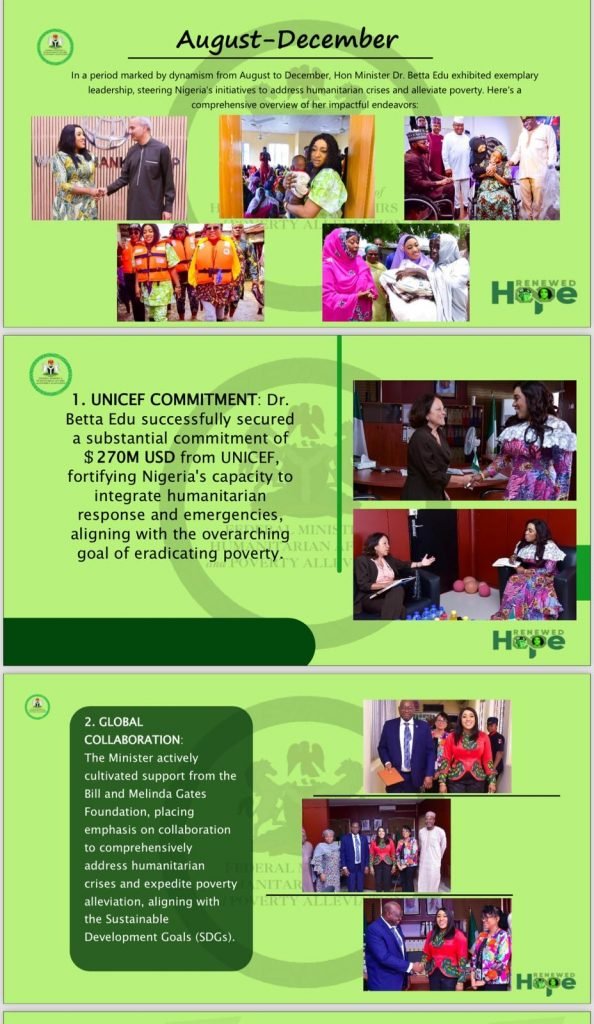…….Arimoro Appeals to President Tinubu to reinstate her back to office
The founder of the Sustainable National Movement, KAYODE Arimoro says the situation surrounding the precipitously suspended Minister of Humanitarian Affairs and Poverty Alleviation, Dr. Betta Edu, has unraveled a series of events that question the integrity and efficiency of public service operations.
Arimoro in a statement issued in Abuja explained that the chronicle has indeed cast a spotlight on the intricate challenges within Nigeria’s governance frameworks as various accounts suggest that the controversy began with a request for cash distribution to vulnerable groups, which quickly escalated into allegations of misappropriated funds and a subsequent investigation by the Economic and Financial Crimes Commission (EFCC).
Arimoro emphasizes that this has led to broader discussions about the need for transparency, accountability, and robust checks and balances within the Nigerian government.
The claim by EFCC to have recovered a significant sum of money during the ongoing investigation further underscores the potential scale of the governance issues at hand as the country grapples with these revelations, it becomes increasingly clear that addressing these systemic issues is crucial for advancing governance and preventing corruption, he re-emphasized.
“Although, huge sums are said to be recovered, there was no direct information from who or where it was recovered from. Some media houses tend to imply those recoveries to Dr. Betta Edu, but that is not the case. EFCC has come out to clarify that their investigation is about the system, not an individual. Let us be reminded that when we flaunt freedom of information, it does not give anybody or any group the right to defame one’s image or character, as there are consequences, and we have begun the process of ensuring that such actions have consequences.
We strongly believe that the system contributes up to 90 percent of the current situation, especially concerning Dr. Betta Edu”.
The Sustainable National Movement further believes that the situation described raises important questions about the processes and safeguards in place within governmental bodies to prevent mismanagement and misuse of public funds.
“The case of former Minister of health Adenike Grange, who faced scrutiny over the approval of end-of-year payouts, serves as a cautionary tale of how a respected career like that of Dr. Betty Edu, can be tarnished by allegations of impropriety”.
It points out that Before proceeding, it is important to highlight her performance as humanitarian affairs minister.
“Dr. Betta Edu is a professional and kind-hearted woman whose first 100 days in office have been marked by a proactive approach to addressing the needs of Nigerians across various states. Her efforts in providing relief, addressing humanitarian crises, and advancing the Renewed Hope Agenda for Poverty Alleviation have shown a commitment to uplifting the downtrodden. The construction of low-cost Renewed Hope shelters is a testament to her dedication to creating sustainable solutions for the displaced”.
With international support, Dr. Edu’s initiatives are contributing to the fight against poverty, unemployment, and irregular migration while also ensuring food security and the rebuilding of lives affected by conflict.
Further more, the initiatives led by Minister Dr. Betta Edu, in collaboration with President Bola Ahmed Tinubu and international partners, reflect a comprehensive approach to tackling poverty and enhancing economic opportunities in Nigeria.
“The focus on Adire fabric production, vocational training, and support for market women through interest-free loans are steps towards sustainable development”.
These efforts, alongside the targeted assistance for persons with disabilities and the drive to eliminate hunger, showcase a multifaceted strategy to improve the livelihoods of millions, fostering local entrepreneurship and job creation.
Dr. Betta Edu’s Renewed Hope initiative is a beacon of compassion and progress, transforming lives across various states with its multifaceted approach to empowerment.
Her efforts are creating sustainable change, from the distribution of essential tools and machines to support small-scale businesses to the construction of affordable housing.

The National Homegrown School Feeding Programme is a testament to her commitment to nurturing the future generation, aiming to nourish millions of schoolchildren.
Dr. Edu’s work is not just about aid; it’s about providing the foundation for a brighter, self-sufficient future for all those touched by her initiatives.
The recent commitment of $270 million by UNICEF to Nigeria, facilitated by Dr. Betta Edu, marks a significant boost in the country’s efforts to enhance its humanitarian response mechanisms and emergency preparedness.
The collaboration between UNICEF and the Nigerian government, under the leadership of Dr. Edu, is a promising step towards achieving substantial progress in poverty alleviation and improving the lives of millions.
With such a powerful profile above, it is doubtful that Dr. Edu would condescend to the ignoble degree of fleecing the country she has invested huge efforts through government to provide succour to her less privileged citizens, through cultivating global collaborations, proactively seeking military assistance to prevent humanitarian crises, and successfully advocating for and gaining approval for the establishment of the Humanitarian and Poverty Alleviation Trust Fund – to raise $5 billion annually for Nigeria’s Humanitarian and Poverty Alleviation Trust Fund.
This fund is substantially aimed at reinforcing Nigeria’s infrastructure to effectively manage crises and aligns with the Sustainable Development Goal of eradicating poverty.
The recent initiative in Kogi State, where cash distribution to vulnerable groups was swiftly approved, highlights her commitment to supporting those in need. This action, reportedly based on a memo from the program manager, Mr. Thalis Olonite Apalowo, aligns with the broader objectives of providing relief to disadvantaged populations. It reflects the dedication to addressing poverty and offering immediate assistance.
However, it also highlights the importance of rigorous vetting and transparency in executing such programs.
Ensuring that these processes are clear and accountable is crucial for maintaining public trust and the integrity of the initiatives aimed at alleviating hardship among the most vulnerable members of society.

The balance between rapid aid and meticulous oversight is a delicate one, but it is essential for the success and sustainability of humanitarian efforts.
While we agree it is crucial for public officials, such as ministers, to exercise due diligence and maintain a high standard of ethics to uphold the integrity of their office and the trust of the public, the swift approval process by Dr. Edu in this case, reflects commendable responsiveness to urgent needs.
In the context of public administration, the protocol concerning communication and approval processes is of paramount importance to ensure transparency and accountability. It is generally expected that program managers communicate through the proper channels, which typically involve the Permanent Secretary, who then liaises with the Minister. This hierarchy helps maintain a clear record of decisions and actions. The bulk payment of allowances, if it has been a longstanding practice within a ministry, should be subject to regular audits and reviews to prevent any misuse of funds.
The role of the Permanent Secretary, as the chief administrative officer, is crucial in overseeing these processes and ensuring that all actions are in accordance with policy and legal frameworks. The case of Abel Olumuyiwa Enitan, noted for his experience in the civil service, underscores the significance of seasoned professionals in navigating the complexities of government operations and safeguarding the integrity of public service. It is through such diligence and adherence to established protocols that public trust can be maintained and the risk of irregularities minimized.
Again, in the context of governmental procedures, it is indeed crucial to adhere to established protocols. The Permanent Secretary acts as a pivotal conduit between the Minister and the rest of the Ministry, ensuring that all communications and requests for approval are properly vetted and authorized. This hierarchical structure is designed to maintain order, facilitate accountability, and ensure that due diligence is conducted at every level. Mr. Apalowo’s oversight in bypassing the Permanent Secretary could lead to procedural complications, which it has indeed. It is essential for the internal audit department to be involved early on to assess fund availability and compliance with regulations before any proposal reaches the Minister’s desk for final approval. Such meticulous attention to protocol not only streamlines the process but also upholds the integrity of the ministry’s operations.
The role of an internal audit department is crucial in identifying and addressing anomalies within an organization. In the context of public service, as highlighted in the case involving air tickets to Kogi, the expectation is that the internal audit would serve as a safeguard against irregularities. The situation described suggests a lapse in the checks and balances that are essential for maintaining transparency and accountability. Mr. Enitan, as a senior official, bears the responsibility to ensure that proper guidance and advice are provided to the Minister.
The failure to do so not only undermines the integrity of the department but also reflects on the systemic issues that can plague governmental operations. The minister can therefore not be blamed for speedy approval in this case. Although, it is imperative for all involved in such processes to adhere strictly to protocols and for oversight mechanisms to be robust enough to prevent such oversights.
In the structure of government ministries, the delineation of responsibilities between a Minister and a Permanent Secretary (PS) is crucial for efficient governance. The Minister, often a political appointee, sets policy direction and represents the ministry’s interests in the broader government framework and to the public.
On the other hand, the PS, as the Chief Accounting Officer, handles the day-to-day operations, including financial transactions, procurement, and human resource matters. This separation ensures that strategic leadership is complemented by professional management, with the PS acting as a conduit between the ministerial vision and bureaucratic execution. Such a system promotes accountability and allows for specialized expertise to guide operational decisions within the ministries.
These events reflect the broader concerns about the integrity of political systems and the need for robust mechanisms to ensure transparency and accountability. Effective governance relies on the adherence to rules and the ethical training of appointees to prevent the misuse of positions for personal gain. Addressing these issues is crucial for maintaining public trust and the proper functioning of democratic institutions.

The importance of thorough training for government appointees cannot be overstated. It is essential for the effective functioning of any administration that individuals in these positions are well-versed in the core values, policies, and ethical obligations of their roles. In-depth orientations provide appointees with a comprehensive understanding of the administration’s vision and policy priorities and the necessary tools to navigate the complexities of government service.
However, in the absence of this orientation, the PS of the Ministry should have guided Dr. Edu to ensure compliance to civil service procedures. Failure of the PS to do so may indicate culpability or an organized set-up to trap the performing Minister.
In the realm of public service, accountability and adherence to established procedures are paramount. As reported, the situation involving Mr.
Enitan and Mr. Apalowo suggests a deviation from standard civil service protocols, which warrants a thorough investigation by the Head of Service. If the allegations are substantiated, it would be within the Head of Service’s purview to impose appropriate sanctions to uphold the integrity of the civil service. Such measures not only serve to rectify the immediate issue but also act as a deterrent against future breaches, thereby reinforcing the commitment to due process and ethical conduct within public administration.
Through such diligence, trust in public institutions can be maintained and strengthened.
Passionate and creative appointees like Dr. Betty Edu can remain on board to continue their good work.
We appeal to Mr. President to reinstate Dr. Betty Edu to her position so that her best-in-class performance can continue.





